On The Town .. Feb 17, 2014
On February 24th at the Lambs Club in NYC, Larissa Mark will be the first recipient of the Dramatist Guild's new "Defender Award." (Congrats, Larissa!) And I'm very much looking forward to seeing her school's production of Rent in March.
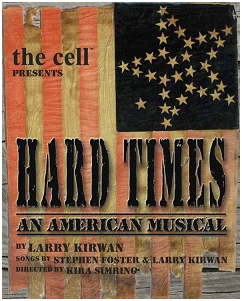
An actor/director friend asked me if I’d seen anything magical in theater of late. I told him Hard Times, at the tiny Cell Theater on 23rd Street. He hadn’t heard of Hard Times, or the Cell. I wish I’d taken him. Because you never know where you’re going to experience magic. It’s not necessarily going to be in the biggest theaters, where producers are spending the most money.
People who are smart and wise, and imaginative and committed can create theatrical magic anywhere. The people who created and presented Hard Times at the Cell Theater impressed me on every level. There’s something so sharp, so hip, so together about this production, I left the theater eager to see more of their work. There’s an intelligence operating in this production. When it was over, I didn’t want to walk out of the theater. I was entranced.
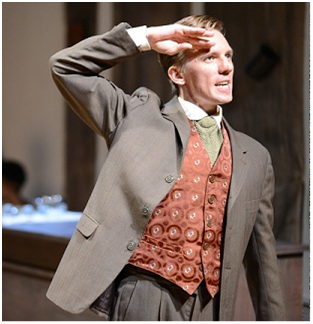
Jed Peterson as Stephen Foster in Hard Times
I didn’t expect to be. The first thing I heard about Hard Times was that it was inspired by the life of songwriter Stephen Foster…. Well, all right. I respect Stephen Foster. I understand his importance in American musical history. Master songwriter Irving Berlin–the most successful individual songwriter in America history–had two portraits on the walls of his office: Stephen Foster and George M. Cohan. Berlin considered them the founders of American popular music, his own first important sources of inspiration; Berlin saw himself as building upon their foundation. Okay. I get Foster’s historical significance.
But could Foster’s life and music hold an audience’s interest today? Was there anything new to his story that hadn’t been told before? I remembered Daryl F. Zanuck’s big–but, aside from some musical performances, not particularly engaging–film biography, Swanee River (starring Don Ameche as Stephen Foster, Al Jolson as E.P. Christy); in fact, I’ve long had the videotape of that 1938 film in my collection. That was a solid, respectable, but not always interesting film.
I remembered, too, that Robert Dahdah–a savvy theater writer/director, who’d helped bring us such hits as Curly McDimple and Dames at Sea–had once tried to develop a Stephen Foster musical show; but it came and went awfully quickly, suggesting that Foster’s day was long past. I figured Foster’s music may have gotten a bit arthritic with age, that there probably wasn’t enough in his life and times to hold contemporary audiences. But I was wrong.
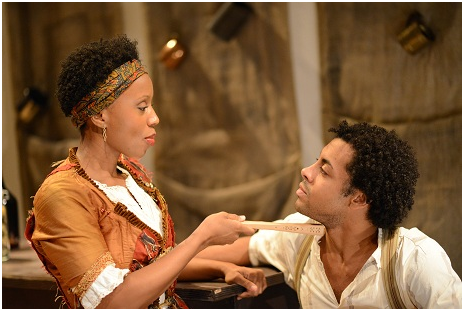
Almeria Campbell & Stephane Duret in Hard Times
I was hit harder emotionally by this intimate new musical, Hard Times, than by many big musicals I’ve seen of late. Most everything fell into place just right: actors–such as Jed Peterson, Almeria Campbell, Stephane Duret, John Charles McLaughlin–performing with honesty, conviction, and real flair; dances–choreographed by Joe Barros–that not only entertained, they illustrated the points made by the script; a killer six-piece orchestra, under the direction of Rona Siddiqui, playing fresh, intriguing arrangements by Andrew Smithson; evocative costumes by Sarah Gosnell; a simple but imaginative set design by Dara Wishingrad….
It’s a rare and wondrous thing when all elements come together just so, and you have theatrical magic. But this little show–written by Larry Kirwan and directed by Kira Simring–offers just that. And even when I thought the show was over–and I felt thoroughly satisfied–the director, choreographer, and performers surprised us by giving us something more, something extra, to excite us even more, in the curtain calls. An excellent night of entertainment.
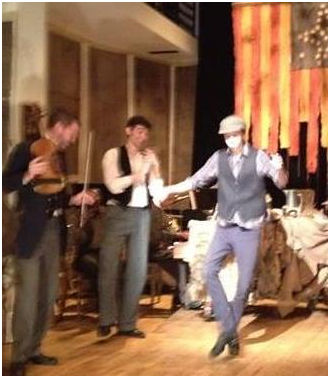
Fiddler Jake James tap dances in Hard Times
Hard Times, set in the Five Points district of New York–where Foster was living in 1863–opens a window on a world most of us will not have known about: a community in which Irish-Americans and African-Americans were living together. We get a look at the roots of American song and dance–the blending of African and European ideas about music and dancing. The fascinating band includes both an impressive fiddler (Jake James) and African drummer (Ayesu Lartey). Barros’ terrific choreography draws upon both Irish-American and African-American styles of dance; I was thrilled by the way he presented them both. The show didn’t just tell us that at that time, in that place, African-American and Irish-American traditions were mixing, it showed us such things happening. The show is as much about race relations as it is about Foster.
Jed Peterson is perfectly cast as a down-on-his-luck Stephen Foster. And the score abounds with riches from the Foster songbook, imaginatively reinterpreted and adapted. I’d forgotten how beautiful some of the Foster ballads were, how infectious some of his uptempo numbers could be. Almeria Campbell shines as a proud, free black woman, running a saloon and trying to make her way in a rapidly changing world. And what appealing voices the singing actors in this show have.
Playwright Kirwan (who has also contributed to the score, revising some lyrics for dramatic purposes) offers speculations as to Foster’s thoughts and feelings. Kirwan may not always be on firm historical ground; the reality that he constructs, as a playwright, for Foster and company may at times be more in the realm of possibility than likelihood. But I suspended disbelief, accepted that this was one possible scenario, and quickly got caught up–enthralled even, by night’s end–in the drama and the entertainment.
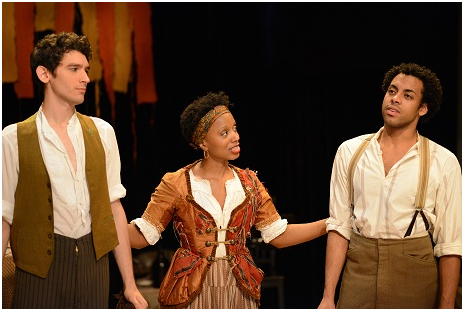
John Charles McLaughlin, Almeria Campbell and Stephane Duret in Hard Times
There were some minor flaws. For example, I wish they’d make it clearer, via shifts in lighting and/or music, when a flashback was beginning and ending. And sometimes characters spoke in a way that simply seemed too modern for 1863, suggesting a too-contemporary sort of consciousness. And there is a dance move or two I’d perhaps cut as not representing that time. But those are minor flaws. This little show is the real thing; it packs a mighty big wallop. It was enough to restore my faith in the potential of theater. You can feel the commitment to the material of every actor and musician on that stage; you feel the care that the director and choreographer have invested, in trying to bring Kirwan’s vision to life.
Kirwan speculates that one reason Foster, at the end of life, was separated from his wife and living quietly on the margins of society, was that he was attracted towards men–that Foster was, in today’s parlance, gay (although that particular term, with its current meaning, did not exist back then). Is that historically accurate? We may never know for sure. But that is part of the story Kirwan is telling us. And it feels, in this play, to be plausible. The setting for this play is a bar owned by a free black woman, who is living with a white Irish-American man. Such couples did indeed exist in the Five Points district at this time. (There was even a term back then for such free, ahead-of-their-times mixed-race couples: “amalgamationists.”) Kirwan offers us a musical play that seeks to educate, raise questions for us to think about, and entertain. And he succeeds.
Hard Times is very good work, and I am confident it will have life beyond this run. It deserves to be seen by a larger public. And my hunch is, it will.
<iframe width=”560″ height=”315″ src=”//www.youtube.com/embed/L2GfNQ5R_-g” frameborder=”0″ allowfullscreen></iframe>
Here is a video, showing evocative historical images that relate to the show, which was prepared for the first tryout production of Hard Times in 2012. There’s no footage or cast album yet available, alas, of the actual current production.
* * *
By every standard–size of the cast, size of the theater, size of the budget–Titanic, now running at the Westchester Broadway dinner theater in Elmsford, New York, is a much bigger production than Hard Times. (Not nearly as big as the original Broadway production, I might add–but still, far, far bigger than
Hard Times.) It is a reminder that, when it comes to shows, bigger is not always better.
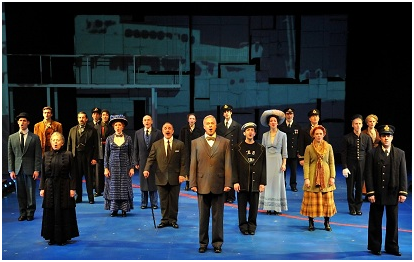
Full Cast of Titanic Photos by John Vecchiolla
I wanted very much to like this production. Titanic has recently been revived to acclaim in England, and will also be revived before long on Broadway. So the timing for the Westchester Broadway dinner theater to present this show would seem just about right. But I have very mixed feelings about the production of Titanic–directed by Don Stephenson, who was a member of the original Broadway cast back in 1997 and has directed other productions elsewhere–running now at Westchester Broadway.
On the plus side, the refined, stately score by Maury Yeston contains some truly lovely melodies, which I enjoyed hearing. But too many of the musical numbers are slow and similar in feel; and the first act of the show is sluggish. (There’s more drama and a brisker pace in the second act.) There are a few very good performances in this production–most notably Adam Heller’s portrayal of J. Bruce Ismay, Chairman of the White Star Line, and William Parry’s portrayal of Captain Edward J. Smith. They made their moments count.
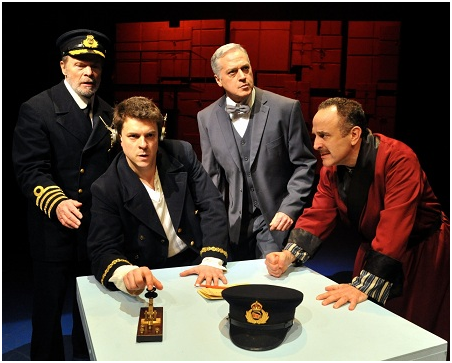
l to r: William Parry (as Captain Smith), Jeremy Ellison Gladstone (as Harold Bride), Tom Hewitt (as Thomas Andrews) and Adam Heller (as J Bruce Ismay) Photos by John Vecchiolla
But Peter Stone’s book is cluttered with too many characters, giving the show almost the feeling of a pageant. We do not come to know the characters well enough to really bond with them. And when the ship eventually sinks, we feel somewhat removed, detached. We know that many people lost their lives on the Titanic, but our emotions are not touched as strongly as they are in the film Titanic; there, the screenplay wisely focuses on two characters, and we come to care about them; when one of them finally dies, we’re deeply affected. Peter Stone’s book does not make us care very much about any of the many characters we meet.
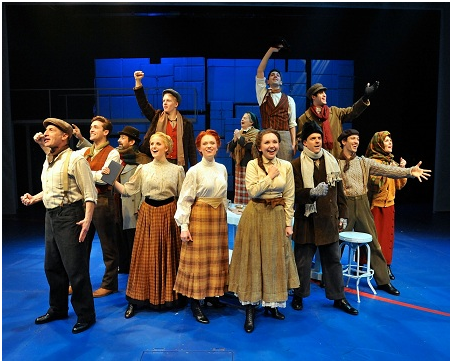
The Third class passengers of Titanic Photos by John Vecchiolla
And from where I sat–far up in the theater, far from the stage–it was often difficult to tell one cast member from another. And some of the actors seemed to be performing almost by rote. They had jobs to do and they were doing them; but the sense of commitment was missing.
Some of the groupings in the first act appeared almost arbitrary. We’d see 15 or more actors standing around on a stage; we understood that they were supposed to on board a ship, but they could just as easily have simply been actors gathering for a rehearsal of a show (or for some sort of choral concert). I saw a mass of people, not always artfully gathered on a stage. I couldn’t help but thinking, as I watched those actors standing about on stage, of how well director Steven Carl McCasland had grouped actors on a nearly bare stage, in his production of Rags at the Connolly Theater, in New York City. In the opening scene of Rags, the actors made a more striking visual appearance, and effectively conjured up passengers on a ship (not merely actors standing about a stage, as sometimes happened her). I was a little disappointed in some of the staging at Westchester Broadway.
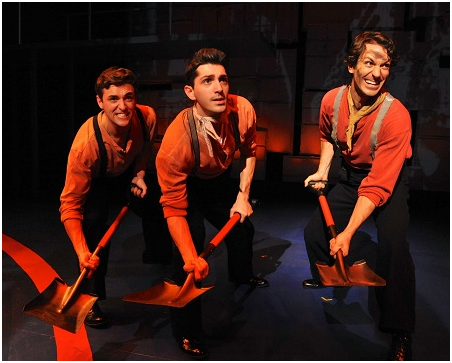
shovels
The original Broadway production of Titanic–capitalized at $10 million–was one of the most expensive shows ever mounted on Broadway up until that time. In the original Broadway production, the big, lavish set helped to make up for–and helped to conceal–some of the deficiencies in the script and score. Here in the Westchester Broadway dinner theater production–with very little in terms of a set–the weaknesses in the script and score seem more apparent than ever. For me, the lack of variety in the score, and the detached tone of the book, are turn-offs. I cared about the main characters in the hugely popular film of Titanic–and the main characters in the intimate musical Hard Times–far more than I cared about any of the characters in the musical Titanic. The original Broadway production of Titanic lasted 804 performances. I’ll be curious to see how well the upcoming Broadway revival does, and what choices they make in terms of setting and staging, and what revisions, if any, might be made to the script.
Here’s a video promo trailer for Titanic, prepared by the Westchester Broadway Theater. (I very much like that they make these videos available. If you watch the video and feel this is something you’d enjoy, go:
* * *
I want to offer congratulations to two impressive ladies of the theater who happen to be fully 80 years apart in age….
As a Dramatist Guild member, I am very happy that the Guild will be presenting a special award to 17-year-old Larissa Mark, https://www.facebook.com/larissa.mark.9 for successfully leading the fight to present Jonathan Larson’s musical Rent at her high school. As you may recall, the principal tried to cancel the students’ planned production of Rent as their school musical at Trumbull (CT) High School, saying it was too controversial to be performed at their school. Larsissa Mark organized a campaign to let the show go on, which soon attracted national attention. (Even Stephen Schwartz–co-creator of such shows as Godspell, Pippin, and Wicked, and current president of the Dramatists Guild, wrote to the principal at Trumbull High School, urging him not to censor Rent, and offering the assistance of Dramatist Guild members, in helping the school turn a production of Rent into a learning experience. Schwartz argued that if some of the content of Rent seemed controversial, it would be better for students and educators to discuss such issues than simply avoid them.)

Larissa Mark
On February 24th at the Lambs Club in NYC, Larissa Mark will be the first recipient of the Dramatist Guild’s new “Defender Award.” (Congrats, Larissa!) And I’m very much looking forward to seeing her school’s production of Rent in March. Mark is serving as stage-manager of the production, and also serving as assistant director. The show is being directed by a high-school faculty member, Jessica Spillane, who’s commented, regarding Larissa Mark: “I couldn’t be more proud of her!!”.

Mark commented: “I am incredibly honored to be The Dramatist Guild’s first recipient of the … Defender Award for fighting the cancellation of Trumbull High School’s production of Rent. Thank you to everyone who supported our Thespian Troupe in our endeavor to bring Rent into fruition this Spring!”
Schools often seem to worry that shows which were hits on Broadway might be too controversial for their students to handle. The most amusing case I’ve seen this year occurred at the Dalton School, a prestigious private high school in New York City. First they announced that they would be doing Thoroughly Modern Millie as their school musical this year. Then the head of the school announced they would only do a concert of songs from Thoroughly Modern Millie (not the whole show), saying that the show’s plot–in which Millie faced a threat of being kidnapped by Chinese characters and whisked off to China–might offend people who were Chinese. Students protested the proposed cancellation of the show, and a compromise was reached (with the consent of the show’s creators). The show will go on, but–among other changes–the would-be kidnappers will now merely be identified as “Asian” not “Chinese”–which the school somehow feels will be more acceptable. And less likely to give offense to anyone.

Jonathan Larson composer of RENT
I give up trying to make sense of some of these school administrators. Thoroughly Modern Millie, which delighted audiences on Broadway, never offended anyone, to my knowledge. It’s escapist musical comedy. I wanted to tell the head of the Dalton School: “Lighten up!” But I’m glad they’ve resolved everything, and the show–in slightly censored/revised form–will go forward. And I’m glad that Trumbull High School has 17-year-old Larissa Mark, who fought–and won–the right to present the script she wanted to present at her school, without trying to censor/revise the script offered them. She will be attending Columbia University in the Fall. I think she has a bright future ahead of her. She’s shown her strength and independence clearly, while still a youth.
* * *
Edith O’Hara’s strength and independence was clearly visible when she was a youth back in northwest Idaho, where–among other things–she led an all-girl band. That was more than 80 years ago…. She eventually found her true calling–in the theater. The theater bug bit her when, in her youth–due to a shortage of local boys interested in acting–she was cast to portray George Washington in a school play. Her parents instilled in her the attitude that if there’s anything you want to do in life, you should simply go for it–and work hard. That “can do” attitude has served her well.
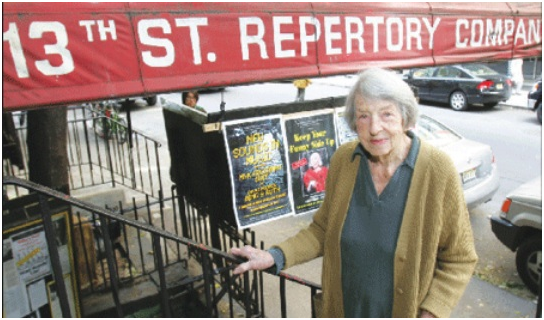
Edith O’Hara Founder-Artistic Director 13th Street Rep
As I write this, I’ve just gotten back from attending Edith O’Hara’s 97th birthday party, and the 13th Street Repertory Theater (50 W. 13th Street, New York City), which she has long run. She is the senior-most theater-owner/producer in New York. She has an idealistic spirit I’ve long found inspiring. (I first met her years ago, when I wrote something about her and her theater for The New York Post. She was then battling real-estate developers who sought to demolish her theater and put up a high-rise in its place; she wasn’t going to about to give up without a fight. All of these years later, she and her theater are still going strong. And I’ve had the pleasure of working with her.) She’s accomplished a great deal in her long life. I think she’s one of the treasures of the New York theater community. I was glad I could be there tonight, to help her celebrate turning 97.
And I was in very good company.

Playwright Israel Horovitz
The award-winning, internationally respected playwright Israel Horovitz was there to congratulate her and praise her. His play Line (which has been produced in more than 120 countries) has been running at her 13th Street Repertory Theater for 40 years. Directed by O’Hara, it is the longest-running production in New York City. Horovitz has written more than 70 produced plays, the best-known one of which is probably his Obie Award-winning The Indian Wants the Bronx, which starred Al Pacino and John Cazale. (I also liked the semi-autobiographical motion picture that Horovitz wrote, Author! Author!, which also starred Pacino.) He’s won two Obie Awards, a Drama Desk Award, the Elliot Norton Award, and has been decorated by the French government as Commandeur dans l’Ordre des Arts et des Lettres, among many other honors. When one of his sons was six, the boy asked Edith O’Hara if she would present at her theater a play he’d just written. O’Hara, who has always been a great believer in encouraging young talent, did just that! (As she says, she could not imagine running a theater company without providing opportunities for children. She sees her mission in life as nourishing the talents of others.)
Abiodun, a founding member of the famed Spoken Word Group “The Last Poets,” was present to congratulate Edith O’Hara tonight, via a poem he’d written especially for the occasion. He also offered a poem he’d written about Harriet Tubman, in honor of black history month–and in honor of the fact that the building that has housed, for over four decades, the 13th Street Repertory Theater, was–in the 19th century–part of “the Underground Railroad.” There is a hidden room under the stage/backstage area, where runaway slaves found shelter, on their journey to freedom. Edith O’Hara likes the sense of history in the building, which is over 200 years old. And so do I.
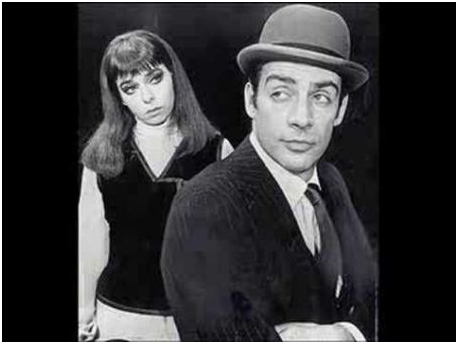 |
Jill O’Hara and Jerry Orbach in Promises Promises 
Jenny O’Hara in King of Queens
Edith O’Hara’s children were present tonight to help her celebrate, too. There were her talented daughters Jill O’Hara (whom I first saw on Broadway in the original casts of Promises, Promises and George M!) and Jenny O’Hara (who–among many other credits–succeeded her sister in Promises, Promises on Broadway, and in more recent years had a recurring role on the sitcom “King of Queens”). And Edith O’Hara’s son, singer/songwriter Jack O’Hara (joined by his wife Annie) offered music he wrote, as part of the birthday festivities.
Joe Striffolino offered a preview of a “rock operical” he’s written, Grey Street, which will have its world premiere, April 9th-May 18th, at the 13th Street Rep. The Jo Jo Music Combo played. And I got to schmooze with people who’ve done or will be doing shows at the13th Street Rep, like Elizabeth Pugh, Jeremy Rosen, and Mary Dimino.
Edith O’Hara has helped many careers over the years, and has produced hundreds of plays. O’Hara helped develop the musical Touch, which ran for two years in New York; its cast album received a Grammy nomination. She first presented the trailblazing gay musical, Bill Solly’s Boy Meets Boy at her 13th Street Repertory Theater, then moved the show to larger theaters in New York and Los Angeles, for successful year-long commercial runs. (Solly had had plays of his produced successfully on the West End in London; but he could not find any producers, in London, New York, or anywhere else, willing to take a chance on his gay musical, until he met O’Hara. She took a chance on him. And he felt right at home–even helping make repairs at the theater. O’Hara has a knack for getting people to help out in all sorts of ways. And she attracts people who love the theater as deeply as she does; Albert Poland, who managed Boy Meets Boy, and became an important theatrical producer and manager in New York, found the pioneering spirit radiated by O’Hara and others on the independent small-theater scene in NYC to be exhilarating.) Tennessee Williams’ “Pieces of Paradise” received its New York premiere, after Williams’ death, at O’Hara’s 13th Street Theater. (Earlier, while Williams was alive, she produced a a revival of another of his plays at her theater; he proclaimed from her stage one night that future of theater in America was not in big Broadway theaters, but in small, independent houses like the 13th Street Rep.) Bette Midler, Barry Manilow, Chazz Palminter, Christopher Meloni and many other notables performed at O’Hara’s theater when they were younger. For 17 years, the unique, dark monologist Brother Theodore (a Greenwich Village icon, whim I enjoyed a lot, and an acknowledged influence on a number of respected performers) made the 13th Street Repertory Theater his base, offering a popular Saturday midnight show. Some plays produced at the 13th Street Rep–like the Rep’s version of A Christmas Carol (written/directed by O’Hara’s longtime second-in-command, Sandra Nordgren)– have also been produced and performed on radio. O’Hara has received commendations from New York mayors and governors, and from President Barak Obama.
What accounts for her success? “If I thought I should do something, I did it,” she has said. She did not make excuses; she did not let health issues (including epileptic seizures) stop her from doing what she wanted to do in life. She has a strong work ethic and surrounds herself with those who are like-minded. The theater’s box-office is open every morning at 10 a.m. If you call the theater to inquire about a play, you are answered by a live human being, not by a recording (which is rarer than it should be these days). Everyone who works at the theater is expected to help out in whatever ways might be needed. And O’Hara, wisely, finds a way for everyone who wants to help out to contribute. When one homeless man asked if he could help in any way, she found things for him to do. When she discovered he was highly artistic, she made Tom Harlan the theater’s resident set designer/costume designer, and gave him a place to live in the building. (O’Hara’s own apartment is above the theater.)
Last year, O’Hara presented a revival of my show One Night with Fanny Brice–starring Mary Cantoni Johnson, directed by Sharon A. Wilcox, with music direction by Richard Danley and costumes by Renee Purdy.https://www.facebook.com/maryjonsun
https://www.facebook.com/sawilcoxIt was a totally satisfying experience for me; it’s just nice to work with caring, giving people. (I’m very grateful to Edith O’Hara, Sandra Nordgren, and June Rachelson Ospa for making that happen.) Oh, that ancient 13th Street building might have some leaks and drafts, and possibly even a ghost or two. But it certainly is rich with history. For our production, O’Hara let us use a trunk that had once belonged to Louisa May Alcott! And I liked standing on that stage and thinking of the various artists, from Tennessee Williams on down, who’d stood there at one time or another. I wish the city would landmark it, for its cultural significance.
The 13th Street Rep is a magnet for people who are passionate about theater. Each year, some 50 or more new interns, from all over the place, somehow find their way to volunteer at the theater. They help out in every imaginable way. O’Hara gives them chances to learn, and also to showcase their skills–in performances at the theater–as aspiring actors, directors, writers. The theater has had me speak to interns about my own experiences as a playwright and director; I’ve enjoyed sharing my experiences in theater with them, and meeting these young people, some of whom will no doubt make their marks in the future. Of the many interns I’ve met there, I just want to mention two names, because I’ll be interested in seeing their future growth as artists. Allison Paige Gilman, from Richmond, Virginia, impressed me instantly; she had the kind of energy and light-in-the-eyes I look for when holding auditions. She’s acted with the Virginia Repertory Company, is studying theater at Emerson, and if she auditioned for the the right role in a show of mine, I’d hire her in an instant. Liz Peak, who began volunteering at the 13th Street Rep the day she got off the plane from her native New Zealand,. Wound up stage-managing One Night with Fanny Brice. I’ve worked with many stage managers in my career (including some I’d never work with again). Liz Peak was first-rate–as good as any stage manager I’ve ever met–and 100% committed to the performing arts. We became good friends. She’s in her early 20s, and I’m sure she has much to contribute. This month I had the pleasure of going to the opening night, on Theater Row (210 W. 42nd Street, NYC) of a new play that she has co-authored and co-directed, Philosophy for Gangsters. I didn’t go as a reviewer–we’ve grown far too close as friends for me to comment in that capacity–but I was very happy to see a friend get her first play on the boards in New York, and see a full house laughing appreciatively. I know so many people who say that “someday” they will finish writing the play they are working on, I’m very happy to see someone so young actually write and direct their first play, and get it up in front of reviewers and the public. But she’s got some of that same “can-do” spirit that Edith O’Hara has. And it’s good to be around that.
I don’t know any place quite like the 13th Street Rep. It is a reflection of the spirit of Edith O’Hara. I hope that O’Hara and the theater will be around forever. However, the property is so valuable, I fear it is only a matter of time before someone finds a way to tear it down and put up something else on the site that would generate more income. O’Hara is so devoted to theater, she has turned down all offers. As long as she is alive, she vows, the theater will be there, and the theatrical community that she has created. I admire her spirit.
If you’d like to know more about Edith O’Hara, here’s a fine 30-minute documentary that Melodie Bryant produced several years back:
* * *
One final brief note. I’d just like to welcome “The Tonight Show” (now starring Jimmy Fallon) back to New York. I think it’s going to have a terrific positive impact on the entertainment community in New York City, having this show back here after so many years on the West Coast. New York-based musical theater performers, pop singers, stand-up comics all should have greater opportunities for TV exposure. Publicists for Broadway shows, supper clubs, and comedy clubs should be very happy right now.
–Chip Deffaa, February 17th, 2014

Leave a comment